A masters in geoscience focuses on the study of the physical processes and structures of the Earth. The program can help prepare students for careers in hydrology, Earth science, mineralogy, energy and natural resources, and more.

Geoscience masters programs are research-oriented, and you may have the option to choose between a thesis or non-thesis program.
Editorial Listing ShortCode:
This graduate program is designed for students who are interested in concentrating their studies on a specific sector of geosciences and developing research, analytical, and synthesis skills.
Online Masters in Geoscience Programs

Geoscience is the study of the Earth, including its structure and history. Students studying for an on-campus or online geoscience degree learn about the intricate processes of the Earth, such as how ecosystems and water systems are interconnected.
Geoscientists use various tools and techniques to study and analyze various elements and resources of the Earth through field studies and sample collection. If you’re interested in studying the physical properties of the Earth and how they coincide, you might consider earning a masters degree in geoscience.
There are several concentration options typically offered with geoscience masters programs. Concentrations can help you focus on one branch of geoscience.
The following concentrations are commonly offered with geoscience graduate programs:
- Hydrogeology
- Geology
- Environmental geosciences
- Paleontology
- Petroleum geology
When deciding on a geoscience masters program, you may consider a thesis or non-thesis option. If you’re interested in doing more research during the program, you may go with the thesis option. This includes core geoscience coursework in the concentration of your choosing and conducting research with the support of your research advisor to develop your thesis.
Editorial Listing ShortCode:
A thesis-based program can prepare students for a doctoral program, a career in academia, or jobs that are very research-oriented. The type of coursework offered in geoscience masters programs can vary depending on whether it’s a thesis or non-thesis program.
The following topics are explored in-depth in a general Master of Science in Geoscience program:
- Geophysics
- Geodynamics
- Geobiology
- Geochemistry
- Structural geology
These courses can help you develop analytical and research skills by studying the various components and physical structures of the Earth. Geoscientists and other related positions can be found in numerous industries, such as architecture, engineering, scientific services, mining and natural resource extraction, and the government.
Geoscience Careers and Salaries
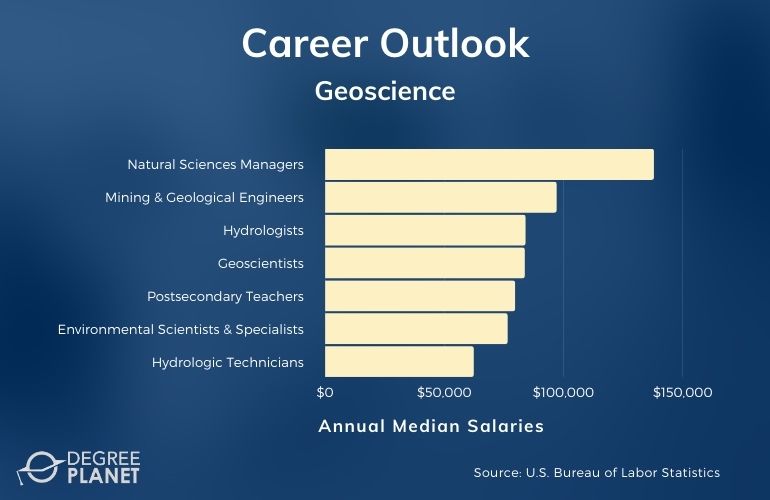
Geoscience careers are often technical in nature and involve researching and analyzing information or data to conduct experiments, tests, or investigations for environmental purposes.
According to the Bureau of Labor Statistics, these are the median salaries of careers related to the geoscience field.
| Careers | Annual Median Salaries |
| Natural Sciences Managers | $137,900 |
| Mining and Geological Engineers | $97,090 |
| Hydrologists | $84,030 |
| Geoscientists | $83,680 |
| Postsecondary Teachers | $79,640 |
| Environmental Scientists and Specialists | $76,530 |
| Hydrologic Technicians | $62,280 |
| High School Teachers | $61,820 |
| Surveyors | $61,600 |
| Geological Technicians | $48,310 |
Responsibilities for geoscience careers can widely vary depending on the industry. Some common responsibilities that geoscience professionals have include conducting field studies and surveys, collecting samples, analyzing data, and compiling it into written reports or charts.
Editorial Listing ShortCode:
They may also monitor environmental projects and programs. Level of education, work experience, and location are a few factors that can impact salaries and job availability.
Master of Geoscience Curriculum & Courses

The Geoscience curriculum focuses on learning natural sciences data collection and analysis methods to examine various physical properties and interactions of the Earth, its features, and structures. Here are some course examples:
- Earth Materials: Physical properties of the Earth, including the chemical composition and atomic structure of materials, are explored in-depth in this course.
- Earth Science Data Analysis: This course examines methodologies to estimate models by using observational data—such as sea-surface temperature and chemical composition of samples—to develop data analysis skills.
- Environmental Geochemistry: You’ll examine the chemical and physical processes of the environment.
- Atmospheric Geochemistry: This course teaches about the Earth’s atmosphere and how human activity has impacted the atmosphere and climate.
- Geobiology: This course examines the interactions between living organisms and the geosphere, paying close attention to how chemical and physical processes have influenced evolution and life on Earth.
- Geodynamics: This class introduces you to the fundamentals of geodynamics, including plate tectonics, gravity, rheology, and mantle convection.
- Structural Geology for Exploration: This course examines various case studies of mineral systems and teaches you how to analyze tectonic structures, fluid flow, and mineral deposit systems.
- Data Use in Science: You’ll learn how to investigate natural sciences questions through various methods of data collection and analysis.
- Mineralising Systems: You’ll study mineralizing system concepts to examine the geographic location, economic importance, and diversity of metallic ore deposits.
- Physical Oceanography: This course teaches you about the interactions between the dynamics of the ocean and the atmosphere.
The coursework may be tailored to your specific interests if you choose to adopt a concentration. Students who want a broader understanding of geoscience may take a variety of courses that address different branches of geoscience, such as geology and oceanography.
Admissions Requirements

Admissions requirements for master’s degrees can vary depending on the school and program. Common admissions requirements for geoscience masters programs can include:
- Bachelor’s degree in geoscience or a related field
- Minimum GPA (only some schools require it)
- Statement of purpose
- Official transcripts
Some of the core coursework included in a masters in geosciences requires students to take introductory courses as prerequisites. A bachelors degree in geoscience or related Earth science allows students to fulfill some of these prerequisites. You can research specific admissions requirements for prospective universities by searching their website or contacting their admissions office.
Accreditation

The accreditation status of a college or university can have an impact on financial aid eligibility as well as future employment and education opportunities. Colleges and universities can seek accreditation from regional accrediting organizations to assure students their facilities, faculty, and resources meet quality standards.
Editorial Listing ShortCode:
Accreditation can be essential at the undergraduate and graduate levels. Admissions offices may take the accreditation status of an institution into consideration when reviewing student applications. It can also impact your eligibility to enter doctoral programs.
Financial Aid and Scholarships
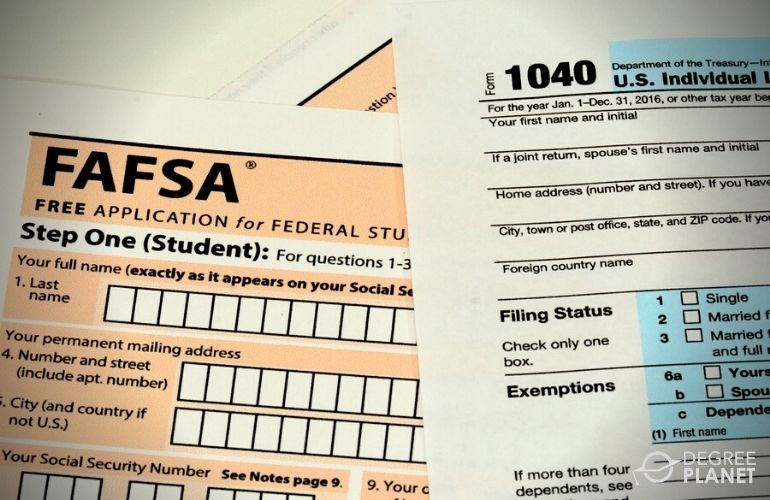
Exploring financial aid and scholarship opportunities may help you reduce the costs of college. Federal and state financial aid is income-based assistance. State financial aid eligibility requirements can vary depending on where you live.
Federal aid is calculated by annual household income or Expected Family Contribution (EFC), cost of tuition, year of enrollment, and other factors. You can find out if you’re eligible for federal aid by submitting a Free Application for Federal Student Aid (FAFSA).
Scholarships can be based on income, academic or athletic merit, location, or specific interests. A scholarship is a monetary award given to select students by a school, nonprofit, or other types of organizations. You can apply for as many scholarships as you’re qualified for in order to potentially increase your chances of receiving one or more of these awards.
What Can You Do with a Masters in Geoscience?
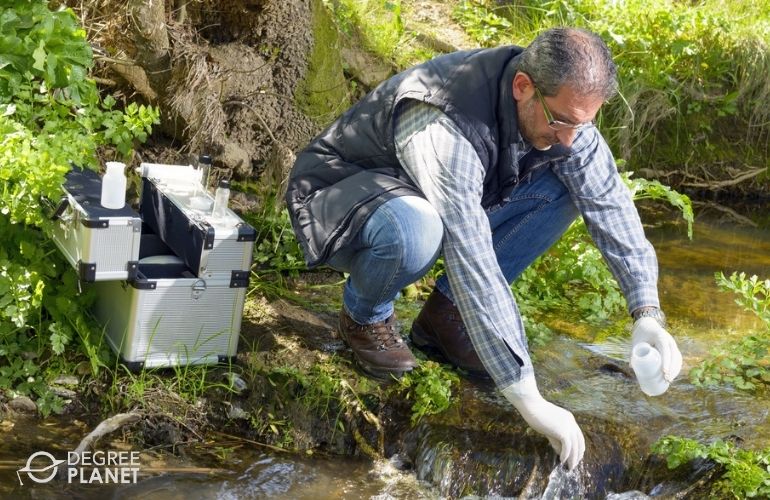
A masters in geoscience can help you develop essential research and analytical skills used in many careers in the natural sciences field. Geoscience professionals may pursue careers as geoscientists, environmental scientists, hydrologists, earth science educators, research assistants, and other similar roles.
According to the Bureau of Labor Statistics, most geoscientists are employed by architectural, engineering, and scientific services. Many of these careers involve working outdoors to conduct field studies and collect samples. Other geoscience professionals may work in labs analyzing collected samples and other environmental data.
How Long Does It Take to Get a Masters in Geoscience Online?

If you’re enrolled as a full-time student, it may take 1 to 2 years to complete a geoscience masters program. A 36-credit hour master’s program with no thesis can generally be completed in 1 year with full-time enrollment, including during the summer.
A thesis-based program or part-time enrollment can add more time. The time it takes to complete a master’s thesis can depend on one’s personal subject area. It may take two semesters to conduct research and complete a thesis.
What’s the Difference Between a Masters in Geoscience vs. Geology?
Geology and geoscience are very similar, and the terms are often used interchangeably, but these programs have slight differences in focus.
| Geology | Geoscience |
|
|
Geology and geoscience masters programs can both prepare professionals for geoscience careers. Geology coursework has a slightly narrower focus involving the study of rocks, minerals, and plate tectonics.
Is a Masters in Geoscience Worth It?

Yes, a masters in geoscience is worth it for many students. It’s a strategic degree path for professionals who want to work in the Earth science field and develop valuable research and analytical skills.
Editorial Listing ShortCode:
This graduate program can also prepare you for an advanced degree with the goal of entering the academic field. Graduates may become a lecturer, research fellows, or postsecondary teachers in this sector. According to the Bureau of Labor Statistics, life, physical, and social science occupations are projected to have 7% job growth over the next ten years.
Universities Offering Online Masters in Geoscience Degree Programs
Methodology: The following school list is in alphabetical order. To be included, a college or university must be regionally accredited and offer degree programs online or in a hybrid format.

The Master of Sciences program at Mississippi State University offers a concentration in Environmental Geosciences. Classes cover topics like ocean science, climatology, geographic information systems, and environmental hazards. The curriculum consists of 10 credit hours. The degree requirements can be completed fully online, though some hands-on experiences on campus or in the field may be available.
Mississippi State University is accredited by the Southern Association of Colleges and Schools Commission on Colleges.

Ohio University offers a Master of Science in Geological Sciences. This non-thesis program is designed for working professionals, geoscientists, and earth science teachers. Classes meet entirely online, and each one is 7 weeks long. The program’s 30 required credit hours can typically be completed in 3 semesters of full-time study.
Ohio University is accredited by the Higher Learning Commission.

Texas A&M University offers a 100% online program for a Master of Geoscience. It offers a concentration in Geographic Information Science and Technology and a concentration in Petroleum Data Management. On average, the program can be completed in 1 year of full-time attendance. New students are admitted 3 times a year.
Texas A&M University is accredited by the Southern Association of Colleges and Schools Commission on Colleges.

The University of Alaska—Anchorage offers a Master of Science in Applied Geological Sciences. The program boasts expert faculty and unique field access to areas of geological significance, such as glaciers, volcanoes, and tectonic plate boundaries. The degree can typically be completed in 2 years. Students can culminate their studies with either a standard thesis or a non-thesis project.
UAA is accredited by the Northwest Commission on Colleges and Universities.
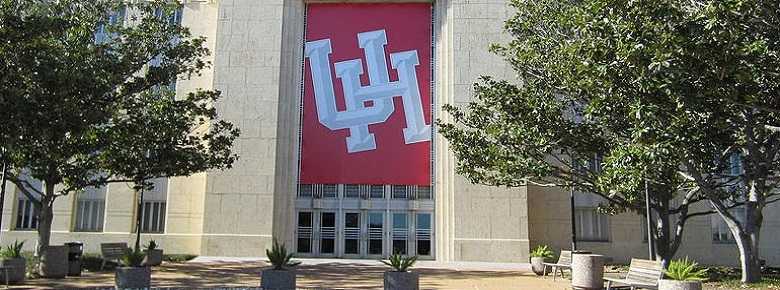
The University of Houston offers a Master of Science in Geology. This program is intended for students with prior experience in the field of geosciences who want to deepen their knowledge and prepare for further studies or career advancement. The curriculum covers topics like petrology, geochemistry, microtectonics, geospatial analysis, and sequence stratigraphy. All classes meet online.
The University of Houston is accredited by the Commission on Colleges of the Southern Association of Colleges and Schools.

The University of North Alabama offers a Master of Science in Geographic Information Science. This curriculum aims to help students develop cutting-edge geospatial techniques alongside versatile critical thinking and analytical skills. The program consists of 33 credit hours and is housed fully online. The degree requirements can typically be completed in 2 years.
The University of North Alabama is accredited by the Southern Association of Colleges and Schools Commission on Colleges.
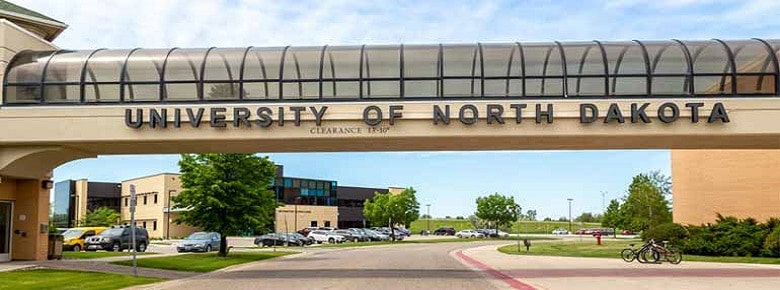
The University of North Dakota offers a Master of Science in Geological Engineering. This program may be an ideal fit for students pursuing careers in petroleum and geothermal energy, geoenvironmentalism, or natural emergency disaster management. Classes can be attended online or on campus. On average, the program’s 30 to 34 required credits can be completed in 2 years of full-time attendance.
UND is accredited by the Higher Learning Commission.

The University of Pennsylvania offers a 100% online program for a Master of Science in Applied Geoscience. Potential courses include Aqueous Geochemistry, Geocomputations, Hydrology, and Applied and Environmental Geophysics. The program can typically be completed in 2 years. Many graduates pursue careers as researchers, geologists, educators, and consultants in a wide variety of settings.
The University of Pennsylvania is accredited by the Middle States Commission on Higher Education.
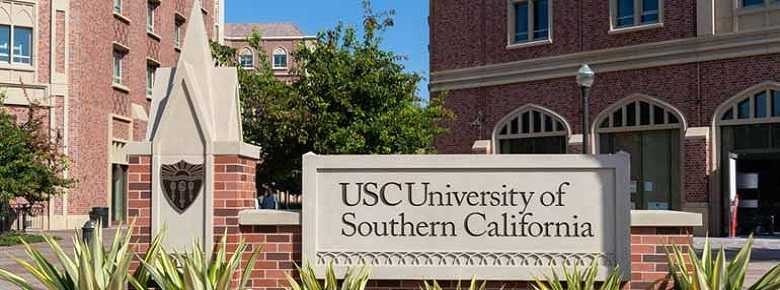
The University of Southern California offers a Master of Science in Petroleum Engineering and Geoscience Technologies. This interdisciplinary program combines key concepts from subjects like physics, geology, mathematics, economics, and thermodynamics.
The curriculum requires the completion of 33 credits and is housed entirely online. Part-time students can often finish in 3 years, while full-time students typically graduate in 2 years
USC is accredited by the Western Association of Schools and Colleges.

Western Governors University offers a Master of Arts in Science Education. Students who plan to teach science in secondary education settings may select a concentration in Earth Sciences. The curriculum covers concepts in disciplines like geology, astronomy, oceanography, and physics. Classes are offered conveniently online and around-the-clock access to coursework and resources is available.
Western Governors University is accredited by the Northwest Commission on Colleges and Universities.
Getting Your Masters in Geoscience Online

Geoscience graduate programs can teach you essential skills and knowledge about sample collection, field studies, and compiling information into written reports to reflect your findings.
You can explore modern geoscience theories and methodologies to prepare you for a career in environmental science, sustainable energy, mineral extraction, and more. Professionals in this field conduct studies and investigations to solve complex real-world issues. This program may be beneficial to students who have a deep interest in natural sciences, engineering, and scientific research.
Much like with a masters in GIS online, you can take your first steps toward receiving an online master’s in geoscience by researching accredited institutions and programs that support your career goals and interests.

